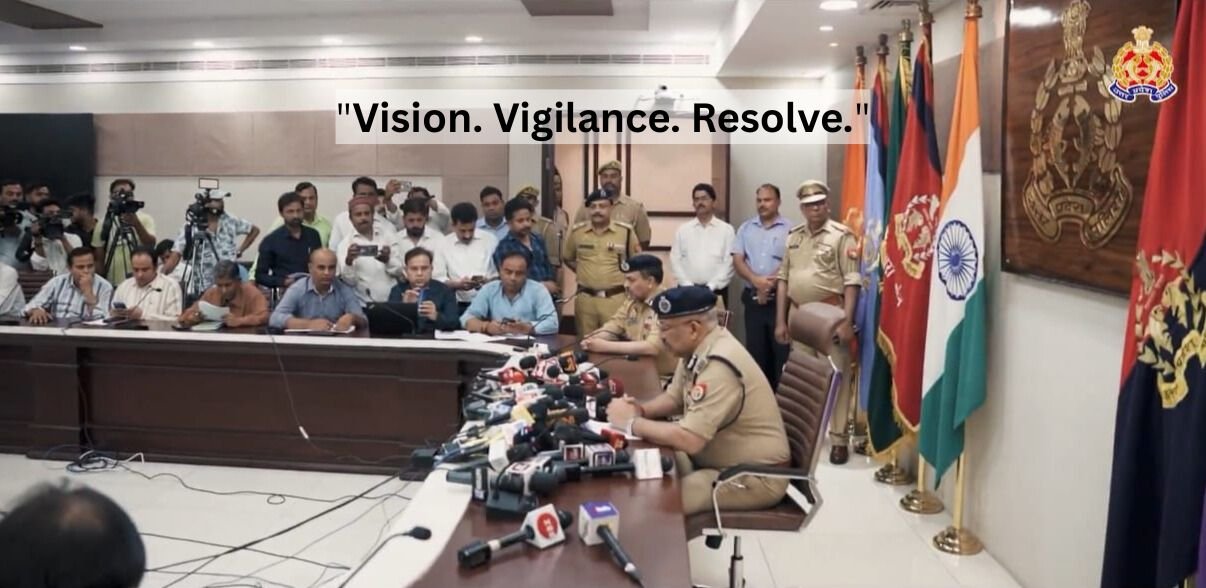The Uttar Pradesh Police is undergoing a significant transformation under the leadership of Director General of Police (DGP) Rajeev Krishna. In his maiden press conference held in June 2025, DGP Krishna unveiled a technology-first 360-degree policing model, guided by the strategic theme: “Vision. Vigilance. Resolve.”
This visionary framework classifies the responsibilities of senior police officers into 11 key priority areas, each aimed at addressing the evolving landscape of law enforcement with speed, precision, and public trust. The move reflects the broader vision of Hon’ble Chief Minister Shri Yogi Adityanath ji to ensure a safe, digitally empowered Uttar Pradesh.

The 11 Strategic Priorities Driving the New UP Police Model:
-
Zero Tolerance Policy Against Crime and Criminals
ADG S.K. Bhagat (ADG Crime, Uttar Pradesh) and ADG Piyush Mordia (ADG, Varanasi) should deploy AI-powered predictive policing to identify emerging crime hotspots. By enabling swift interventions, this strategy will aim to reduce crime recurrence and dismantle organized criminal networks. -
Empowerment and Safety/Protection of Women
Under the leadership of ADG Padmaja Chauhan (Women & Child Security Organisation, Lucknow) and IG Anupam Kulshrestha (ADG, Agra Zone), the focus should shift towards implementing AI-monitored helplines and rapid response systems to support women and ensure real-time accountability. -
Cybercrime Management
As cybercrime incidents grow, ADG Binod Kumar Singh (Cyber Crime Headquarters, Lucknow) and CP Laxmi Singh (Commissioner of Police, Gautam Buddh Nagar) should prioritize enhancing cyber capabilities through blockchain-enabled digital evidence management, AI-driven threat detection, and advanced forensic toolkits. -
Maintenance of Law & Order
ADG Amitabh Yash (STF, Uttar Pradesh) and ADG Alok Singh (ADG, Law & Order) are expected to integrate drone surveillance and facial recognition systems for real-time oversight of sensitive areas, judicial zones, and high-risk public gatherings. -
Better Police Services
ADG, Police Technical Services, and ADG Bhanu Bhaskar (IG Meerut Zone) should focus on further digitizing police services through platforms like CCTNS, enabling citizens to file complaints, monitor case progress, and avail services remotely with efficiency and transparency. -
Police Welfare
R.K. Bhardwaj (IG, Building & Welfare) and Deepak Kumar (Commissioner of Police, Agra) must implement centralized online HR systems, structured mental health support mechanisms, and transparent welfare benefits to uplift force morale and improve internal operations. -
Use of Expertise and Technical Specialization
IG Nachiketa Jha (IG, Establishment) and Amrendra Kumar Sengar (Commissioner of Police, Lucknow) should introduce competency-based officer mapping, supported by AI analytics to assign specialized roles based on experience and skill sets, improving deployment outcomes. -
Use of AI and Technology in Policing
Led by ADG, Police Technical Services and Akhil Kumar (Commissioner of Police, Kanpur Nagar), this vertical should drive the adoption of drones, AI-assisted criminal profiling, digital case management, and smart command control centers to modernize field operations. -
Training
ADG Rajiv Sabbarwal (ADG, Dr. BR Ambedkar Police Academy, Moradabad) and Sanjeev Gupta, ADG Prayagraj Zone should emphasize structured training programs in cyber forensics, AI-driven investigation tools, and modern leadership development to future-proof police capabilities. -
Traffic Management
ADG K. Satya Narayana (ADG Traffic Directorate, UP) and Mohit Agarwal (Commissioner of Police, Varanasi) need to spearhead smart traffic initiatives using IoT devices, AI-backed traffic analytics, and real-time signal monitoring for efficient urban mobility and congestion control. -
Grievance Redressal
ADG Ramit Sharma (ADG Bareilly Zone) should adopt AI-powered dashboards to monitor citizen grievances, ensure timely resolutions, and build measurable public trust through transparent communication and performance metrics.
A Policing Model Rooted in Technology & Trust
At the core of this transformation lies a bold ambition: to make the UP Police a global benchmark for technology-driven, citizen-centric policing. By combining real-time surveillance, digital public interfaces, AI-based crime mapping, and internal process modernization, the force is ready to meet the challenges of the digital age.
The strategy also includes regular skill development, stronger officer welfare programs, and internal reforms to create a more agile, alert, and accountable force.
DGP Rajeev Krishna’s roadmap signals a monumental shift in how police forces across India may evolve in the coming years. This 360-degree framework does not merely aim to control crime—it reimagines the very DNA of modern law enforcement, placing technology, public service, and officer empowerment at its core.
As cybercrime surges, urban populations grow, and public expectations shift, Uttar Pradesh is stepping into the future — boldly and with resolve.



